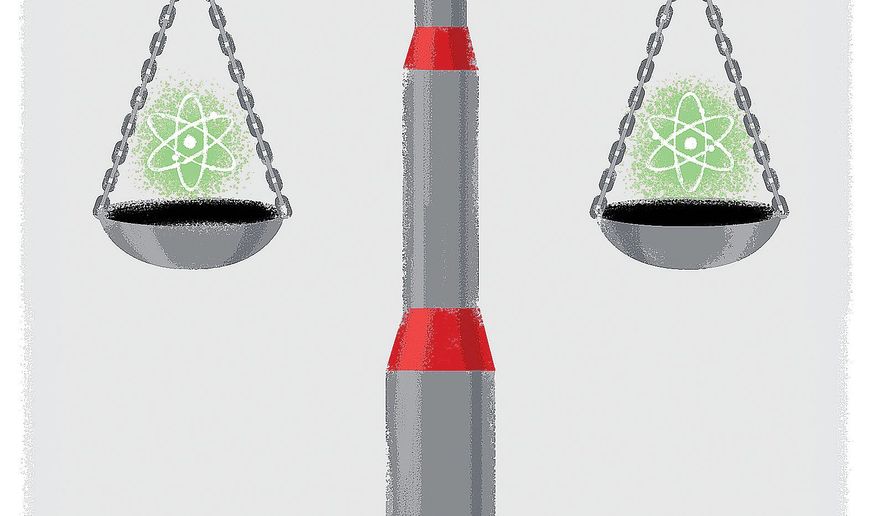OPINION:
Donald Trump inherited two deadly serious national security crises, one in the Middle East, one in the Far East. Look closely and you’ll see that these crises are inseverable.
The dynastic, neo-Stalinist who rules North Korea and the jihadist, imperialist theocrats who rule Iran have always harbored hostile intentions toward America and America’s allies. Both have been illicitly developing nuclear weapons and the means to deliver them to targets in America or anywhere on Earth.
One American president after another has attempted to mitigate their intentions and/or curb their capabilities. One American president after another has failed.
Start with President Clinton who in 1994 concluded the Agreed Accord with Pyongyang. “North Korea will freeze and then dismantle its nuclear program,” he announced at the time. “The United States and international inspectors will carefully monitor North Korea to make sure it keeps its commitments.”
Pyongyang, of course, went on to develop nuclear weapons and increasingly sophisticated missiles. The United States and International Atomic Energy Agency (IAEA) inspectors made sure of nothing.
The North Koreans also colluded with the Iranian regime, even building a nuclear reactor for its client, Syrian dictator Bashar Assad. IAEA inspectors did nothing about that, either, other than politely complain that the Syrian government was not providing sufficient cooperation for them to determine the purpose of the facility.
President George W. Bush thought this dilemma could be resolved diplomatically. The Israelis disagreed. In 2007, the Israeli Air Force reduced the facility to rubble. Four years later, the IAEA belatedly confirmed that the Israelis had indeed destroyed a nuclear reactor.
Mr. Bush also made no progress on the Iranian file. He turned a blind eye as Tehran supported, instructed and armed Shia militias that killed and maimed American troops in Iraq. He was reluctant to widen the conflict.
President Obama’s policy toward North Korea was known as “strategic patience” — wonk lingo for doing nothing. But he lavished attention on Iran’s theocrats, attempting to address their grievances, appease their hegemonic ambitions and bolster those he took to be “moderates.” He was convinced that Iran’s rulers were as eager as Americans to maintain stability in the Middle East.
To be fair, such ideas had long been conventional wisdom within the liberal foreign policy establishment. But they were wrong. At the moment, the most vivid evidence is in Syria, where more than half a million men, women and children have been killed, and many millions more displaced due largely to Iran’s support of Mr. Assad’s war on his Sunni subjects.
Eventually, of course, Mr. Obama concluded — despite congressional disapproval — a deal that has given the world’s leading state sponsor of terrorism more than $100 billion. It has allowed Iran’s rulers to continue developing missiles that can deliver nuclear weapons. And it has let Iranian forces continue what Secretary of State Mike Pompeo last weekend called their “march across the Middle East.”
At the same time, the deal has made it impossible for the IAEA to inspect military sites where Iran’s rulers have covertly worked on nuclear weapons in the past and may be so doing in the present. And it has effectively prevented the U.S. from responding to Tehran’s other nefarious activities — of which there are many.
Sweet as this deal was for Iran’s rulers, the “atomic archive” retrieved by Israel’s Mossad provides clear evidence that they have violated both their obligation to disclose all past nuclear work and their pledge not to “seek, develop or acquire nuclear weapons.”
Two sentences about Europe: In a joint statement last week, France, Britain and Germany asserted that “Iran’s nuclear programme must always remain peaceful and civilian.” This of course expresses not the reality but only their wish, one they have done nothing to make come true.
The approach Mr. Trump has taken toward both Iran and North Korea is quite different. His harsh rhetoric and tough sanctions appear to have caused Kim Jong-un to ponder whether his nuclear ambitions endanger, rather than fortify, his power and longevity. We can be hopeful about upcoming talks. But should Mr. Kim prove deceptive or intransigent, the president must be prepared to walk away and immediately ratchet up his “maximum pressure” strategy.
Couple that with Mr. Trump’s decision last week to withdraw from the Iran deal and the broader logic is plain. Mr. Trump intends to do what his predecessors promised and failed to do: Permanently prevent both these regimes from acquiring the capabilities needed to mass murder Americans at a time of their choosing.
To succeed will require enormous determination, sharply increased economic pressure and a credible threat to use military force as a last resort. If our enemies believe we are stronger than they are and unwilling to take no for answer, they are less likely to give us that answer — assuming they are rational. If they aren’t, all the more reason not to permit them to realize their intentions and achieve their ambitions.
This much should be obvious: Unless the rulers of both Iran and North Korea are defanged, the peril they pose will only grow. It will spread, too: Nuclear non-proliferation will become an idea whose time has gone.
Other regimes will become nuclear-armed. Who would prevent them and on what basis? Sooner or later, some of these regimes will transfer nukes to terrorists. The world — not just the Middle East and Far East — will become a tinderbox. An American president in the not-so-distant future will inherit the crisis. By then, however, there may be no solution, just a day of reckoning.
• Clifford D. May is president of the Foundation for Defense of Democracies and a columnist for The Washington Times.




Please read our comment policy before commenting.